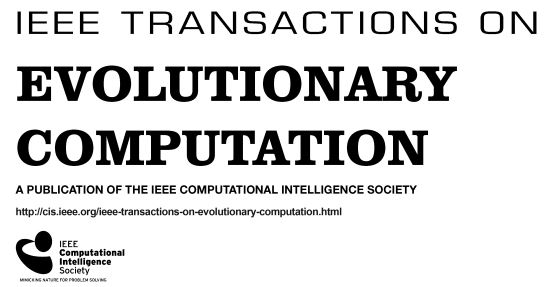
Scope
IEEE Transactions on Evolutionary Computation (TEVC) publishes archival-quality original papers in evolutionary computation and related areas including nature-inspired algorithms, population-based methods, and optimization where selection and variation are integral, and hybrid systems where these paradigms are combined. Purely theoretical papers are considered as are application papers that provide general insights into these areas of computation.
The IEEE TEVC, published six times a year, publishes archival-quality original papers in evolutionary computation and related areas including nature-inspired algorithms, population-based methods, and optimization where selection and variation are integral, and hybrid systems where these paradigms are combined. Purely theoretical papers are considered as are application papers that provide general insights into these areas of computation.
Impact Score
The values displayed for the journal bibliometrics fields in IEEE Xplore are based on the Journal Citation Report from Clarivate from the 2022 report released in June 2023. Journal Citation Metrics Journal Citation Metrics such as Impact Factor, Eigenfactor Score™ and Article Influence Score™ are available where applicable. Each year, Journal Citation Reports© (JCR) from Thomson Reuters examines the influence and impact of scholarly research journals. JCR reveals the relationship between citing and cited journals, offering a systematic, objective means to evaluate the world's leading journals. Find out more about IEEE Journal Rankings.
Special Note:
In order to support the worldwide efforts in flighting the COVID-19, the IEEE Computational Intelligence Society (IEEE CIS) has set up a program, the COVID 19 Initiative. Under this initiative, the IEEE TEVC will expedite, to the extent possible, the processing of all articles submitted to TEVC with primary focus on COVID 19. Here are the important information:
- We have set-up a special Fast-Track under IEEE TEVC to process COVID-19 focused manuscripts. All papers submitted to this Fast Track will be undergone a fast review process, with the targeted first decision within 4 weeks. If the paper can go to the revision stage, the author(s) then have 2 weeks of revision time, followed by another round of review within 3 weeks to reach a final decision. That is to say, we target to reach a final decision for all the Fast Track manuscripts within 9 weeks.
- When you decide to submit to this special Fast Track, please kindly make sure you select the Paper type "Fast Track: COVID-19 Focused Papers". Also, please make sure that your manuscript must be within the scope of IEEE TEVC, as well as with a research focus on COVID-19.
- If accepted, TEVC will arrange to publish and print such articles immediately. Furthermore, all such articles will be published, free-of-charge to authors and readers, as free access for one year from the date of the publication to enable the research findings to be disseminated widely and freely to other researchers and the community at large.
We look forward to your submissions and support to TEVC!
Featured Paper
Data-Driven Evolutionary Optimization: An Overview and Case Studies
Authors: Yaochu Jin, Handing Wang, Tinkle Chugh, Dan Guo, Kaisa Miettinen
Publication: IEEE Transactions on Evolutionary Computation (TEVC)
Issue: Volume 23, Issue 3 – June 2019
Pages: 442-458
Abstract: Most evolutionary optimization algorithms assume that the evaluation of the objective and constraint functions is straightforward. In solving many real-world optimization problems, however, such objective functions may not exist. Instead, computationally expensive numerical simulations or costly physical experiments must be performed for fitness evaluations. In more extreme cases, only historical data are available for performing optimization and no new data can be generated during optimization. Solving evolutionary optimization problems driven by data collected in simulations, physical experiments, production processes, or daily life are termed data-driven evolutionary optimization. In this paper, we provide a taxonomy of different data driven evolutionary optimization problems, discuss main challenges in data-driven evolutionary optimization with respect to the nature and amount of data, and the availability of new data during optimization. Real-world application examples are given to illustrate different model management strategies for different categories of data-driven optimization problems.
Index Terms: Data science, data-driven optimization, evolutionary algorithms (EAs), machine learning, model management, surrogate
IEEE Xplore Link: https://ieeexplore.ieee.org/document/8456559
